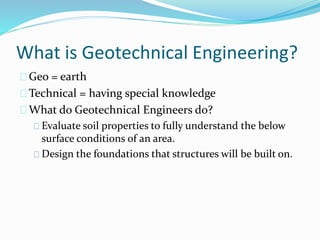Geotheta for Beginners
Geotheta for Beginners
Blog Article
Rumored Buzz on Geotheta
Table of ContentsGeotheta Fundamentals ExplainedThe 9-Minute Rule for GeothetaThe Basic Principles Of Geotheta Geotheta - The FactsGeotheta Can Be Fun For Everyone

They conduct website investigations, gather examples, carry out research laboratory tests, and analyze information to examine the suitability of the ground for building projects - Consulting Engineers. Based on their findings, geotechnical engineers give suggestions for structure style, incline stability, maintaining structures, and mitigation of geotechnical threats. They collaborate with various other experts, such as architects, structural engineers, and construction teams, to make sure that geotechnical factors to consider are integrated right into the overall job layout and implementation
By analyzing the habits and buildings of dirt and rock, they can identify prospective geotechnical hazards such as landslides, dirt settlement, or incline instability. Their experience helps avoid failings or crashes that might threaten lives and residential property. Below are some detailed obligations and responsibilities of a geotechnical engineer: Website Examination: Geotechnical engineers conduct site investigations to gather data on subsurface conditions.
They analyze the information to recognize the residential properties and actions of the soil and rock, including their toughness, leaks in the structure, compaction qualities, and groundwater problems. Geotechnical Analysis and Style: Geotechnical engineers evaluate the information collected throughout website examinations to assess the stability and suitability of the site for building jobs. They perform geotechnical estimations and modeling to review factors such as bearing capability, settlement, slope security, side earth stress, and groundwater circulation.
Examine This Report on Geotheta
Foundation Design: Geotechnical designers play a crucial function in designing foundations that can safely support the desired structure. They evaluate the soil conditions and load needs to identify the proper foundation type, such as superficial foundations (e.g., grounds), deep structures (e.g (https://penzu.com/p/952dfde2dba9ee4f)., heaps), or specialized techniques like dirt enhancement. They think about factors such as settlement limits, bearing capability, and soil-structure communication to establish optimal foundation designs
They examine building strategies, screen site activities, and perform field inspections to confirm that the layout recommendations are complied with. If unanticipated geotechnical problems emerge, they examine the circumstance and offer referrals for removal or adjustments to the style. Threat Evaluation and Mitigation: Geotechnical engineers analyze geotechnical dangers and dangers related to the task site, such as landslides, liquefaction, or soil disintegration.

Cooperation and Communication: Geotechnical engineers work very closely with other specialists included in a task, such as designers, architectural designers, and building and construction teams. Effective communication and partnership are important to incorporate geotechnical considerations right into the total job style and building and construction procedure. Geotechnical designers offer technological expertise, answer questions, and make certain that geotechnical requirements are satisfied.
Geotheta Can Be Fun For Everyone
Here are some kinds of geotechnical engineers: Foundation Designer: Structure designers focus on making and examining structures for structures. They analyze the soil conditions, lots demands, and site qualities to determine the most ideal structure kind and style, such as shallow foundations, deep foundations, or specialized methods like heap structures.
They review the aspects affecting slope security, such as soil properties, groundwater problems, and incline geometry, and create methods to avoid slope failures and reduce dangers. Quake Engineer: Earthquake designers focus on evaluating and making frameworks to hold up against seismic pressures. They evaluate the seismic danger of a website, review soil liquefaction possibility, and create seismic style requirements to make certain the security and resilience of frameworks throughout quakes.
They carry out area testing, gather samples, and examine the accumulated data to define the dirt homes, geologic formations, and groundwater problems at a site. Geotechnical Instrumentation Designer: Geotechnical instrumentation designers concentrate on surveillance and measuring the actions of soil, rock, and frameworks. They install and preserve instrumentation systems that keep an eye on aspects such as soil settlement, groundwater levels, slope activities, and structural variations to assess performance and give early warnings of potential issues.
The 6-Second Trick For Geotheta
They carry out examinations such as triaxial examinations, loan consolidation tests, straight shear tests, and leaks in the structure examinations to gather information for geotechnical analysis and style. Geosynthetics Engineer: Geosynthetics engineers focus on the design and application of geosynthetic materials, such as geotextiles, geogrids, and geomembranes. They use these materials to boost soil security, enhance inclines, supply water drainage remedies, and control erosion.
They have a tendency to be investigative people, which means they're intellectual, introspective, and investigative. They are curious, methodical, reasonable, logical, and logical. A few of them are likewise social, suggesting they're kind, charitable, cooperative, individual, caring, useful, understanding, sensible, and friendly. Does this noise like you? Take our cost-free occupation test to discover if geotechnical engineer is among your top profession suits.
In the office environment, geotechnical designers make use of specialized software program devices to execute estimations, create styles, and examine information. They prepare reports, testimonial task requirements, interact with clients and team participants, and coordinate task tasks. The office setup supplies a favorable setting for study, analysis, and partnership with other specialists involved in the project.
3 Simple Techniques For Geotheta
They regularly visit job websites to perform site investigations, examine geotechnical problems, and gather data for analysis. These gos to involve taking a trip to various places, occasionally in remote or challenging surfaces. Geotechnical designers may perform soil tasting, conduct examinations, and monitor construction activities to make sure that the geotechnical facets of the task are being applied appropriately.
Geotechnical engineers also operate in specialized geotechnical labs. In these centers, they carry out experiments, carry out tests on dirt and rock examples, and examine the design properties of the materials. Geotechnical lab engineers work extensively in these settings, managing screening equipment, running tools, and tape-recording data. They collaborate with various other lab personnel to make certain accurate and reputable testing outcomes.
Report this page